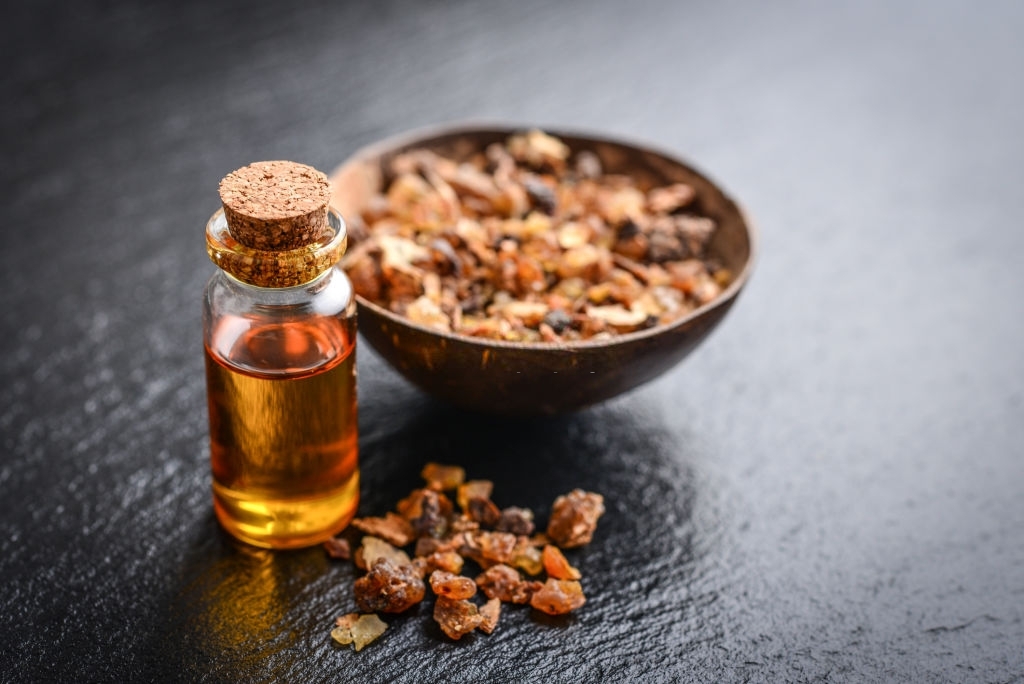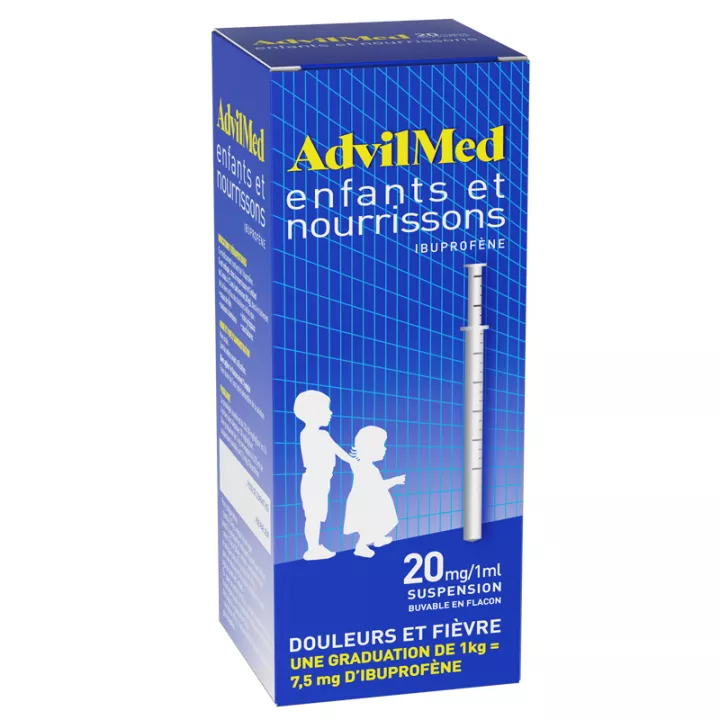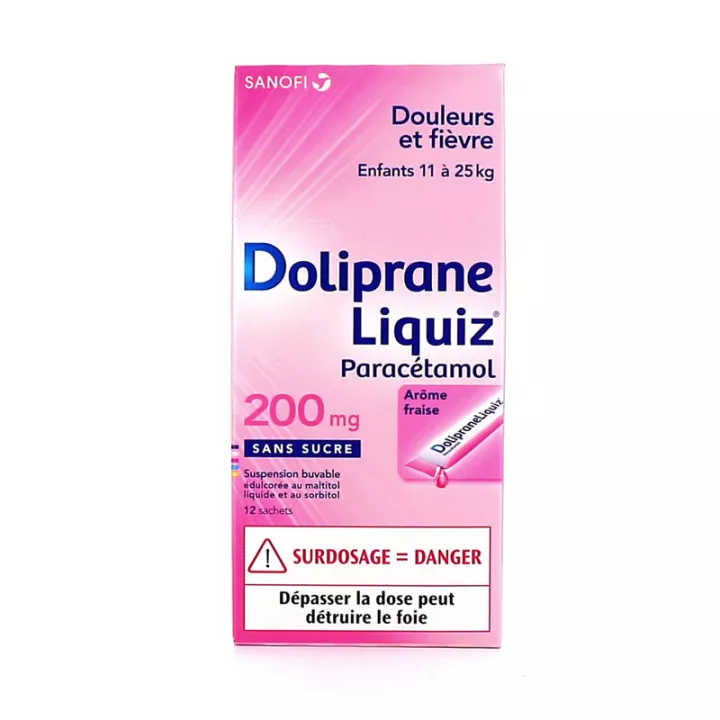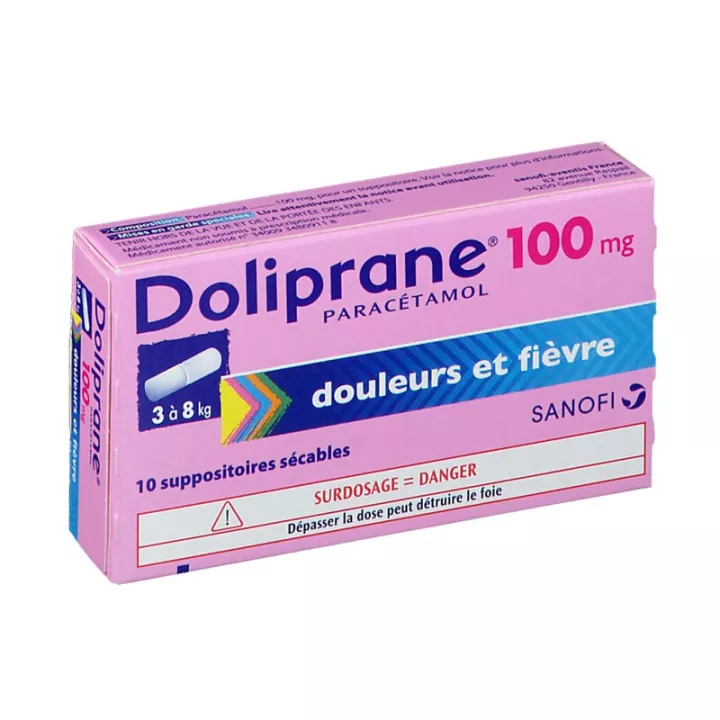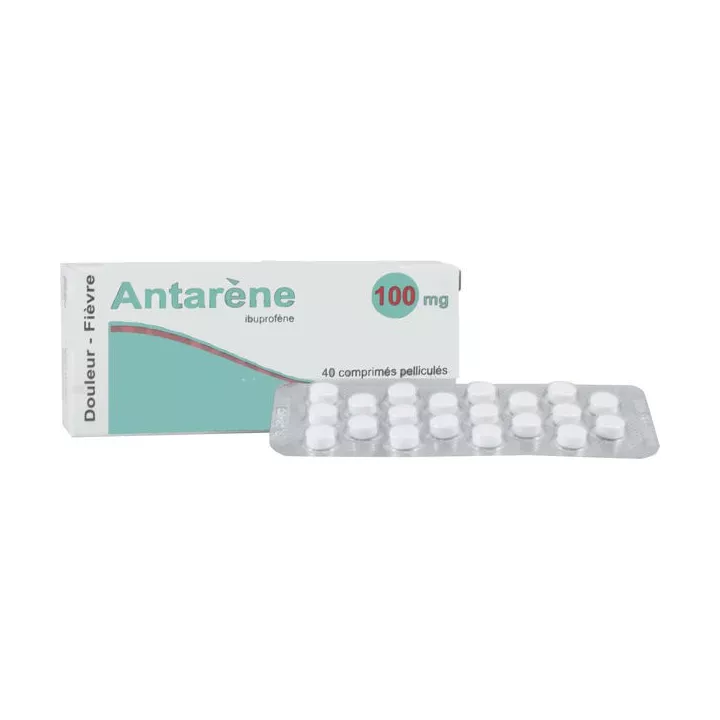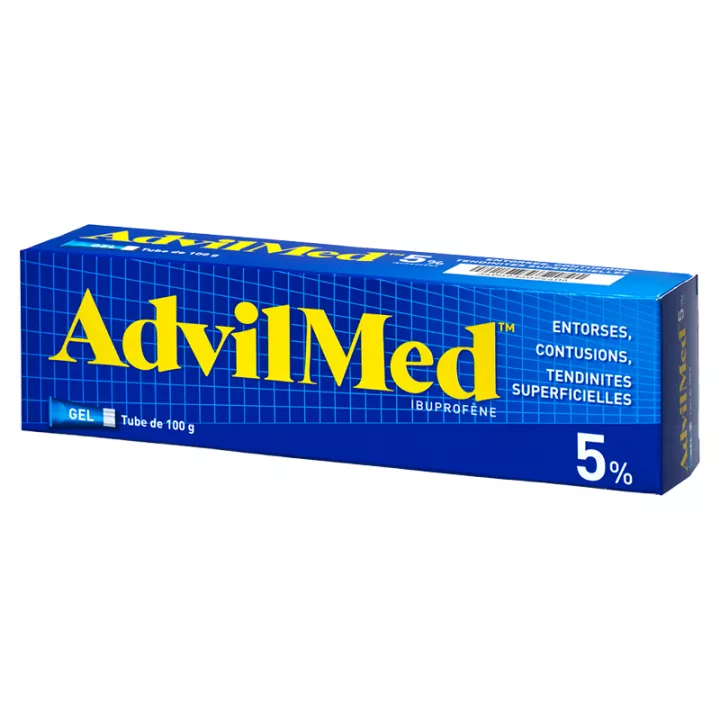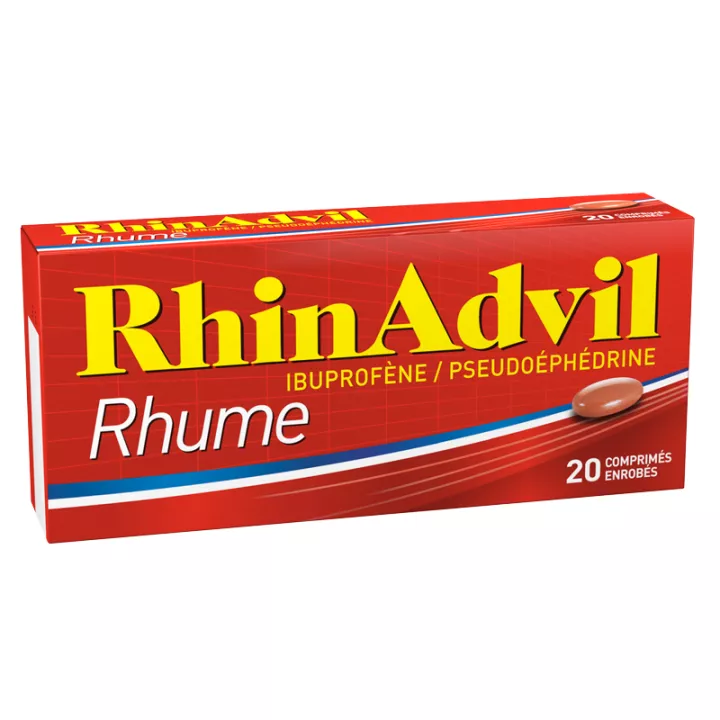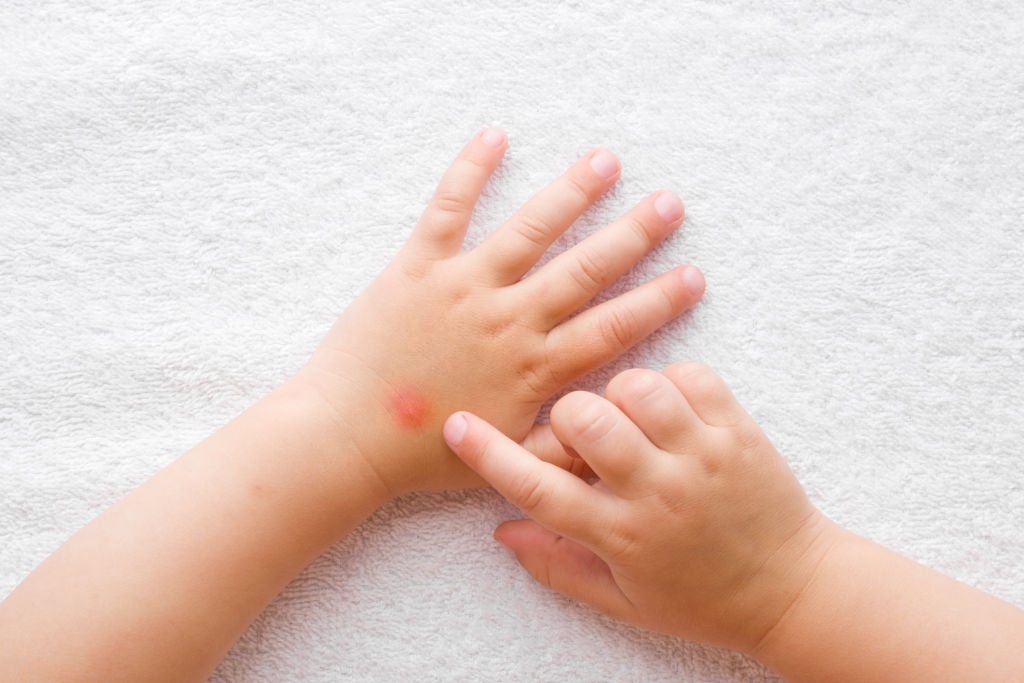NOTICE
ANSM - Updated on: 03/07/2017
Name of the medicinal product
ADVILMED CHILDREN AND INFANTS 20 mg / 1 ml, oral suspension in vial
Ibuprofen
framed
Please read this leaflet carefully before you start taking this medicine because it contains important information for you.
You should always take this medication exactly as prescribed in this leaflet or by your doctor or pharmacist.
· Keep this leaflet. You might need to read it again.
· Ask your pharmacist for advice or information.
· If you experience any side effects, talk to your doctor or pharmacist. This also applies to any side effects not mentioned in this leaflet. See section 4.
· You should contact your doctor if you do not feel any improvement or feel less well: - after 24 hours in the child aged 3 months to 6 months, - after 3 days in children over 6 months and the adolescent.
What is in this leaflet?
1. What is ADVILMED CHILDREN AND INFANTS 20 mg / 1 ml, oral suspension in a vial, and in which cases is it used?
2. What information should I take before taking ADVILMED INFANTS AND INFANTS 20 mg / 1 ml, oral suspension in a vial?
3. How to take ADVILMED CHILDREN AND INFANTS 20 mg / 1 ml, oral suspension in vial?
4. What are the possible side effects?
5. How to store ADVILMED CHILDREN AND INFANTS 20 mg / 1 ml, oral suspension in vial?
6. Package contents and other information.
1. WHAT IS ADVILMED CHILDREN AND INFANTS 20 mg / 1 ml, drinkable suspension in a vial AND WHAT IT IS USED FOR?
Pharmacotherapeutic group - ATC code: NO2B
OTHER ANALGESIC AND ANTIPYRETIC
This medicine contains ibuprofen. It is indicated in infants and children from 3 months to 12 years (about 30 kg), in the treatment of fever and / or pain such as headaches, flu-like conditions, dental pain, aches.
2. BEFORE YOU TAKE ADVILMED CHILDREN AND INFANTS 20 mg / 1 ml, oral suspension in a vial?
If your doctor has told you about an intolerance to some sugars, contact your doctor before taking this medicine
Never take ADVILMED CHILDREN AND INFANTS 20 mg / 1 ml, oral suspension in vial:
· if you are allergic to ibuprofen or to any of the other ingredients of this medication mentioned in section 6.
· after 5 months of pregnancy (24 weeks of amenorrhea),
· if you have a history of allergy or asthma triggered by taking this medication or a related drug, including other non-steroidal anti-inflammatory drugs, acetylsalicylic acid (aspirin),
· if you have a history of gastrointestinal bleeding or ulcers associated with previous NSAID treatments,
· if you have an ulcer or bleeding from the stomach or bowel in progress or recurring,
· if you have gastrointestinal hemorrhage, cerebral hemorrhage or other ongoing hemorrhage,
· if you have a history of gastrointestinal ulcer or gastrointestinal haemorrhage,
· if you have severe liver disease,
· if you have a serious kidney disease,
· if you have a serious heart disease,
· if you have systemic lupus erythematosus,
IN CASE OF DOUBT, IT IS ESSENTIAL TO ASK FOR THE OPINION OF YOUR DOCTOR OR YOUR PHARMACIST.
Warnings and Precautions
Take special care with ADVILMED CHILDREN AND INFANTS:
In high doses, greater than 1200 mg / day, this drug has anti-inflammatory properties and can cause serious disadvantages that are observed with non-steroidal anti-inflammatory drugs.
Medications such as ADVILMED CHILDREN AND INFANTS may increase the risk of heart attack ("myocardial infarction") or stroke. The higher the dose, the greater the risk.
Do not exceed recommended dosage or treatment time.
If you have heart problems including heart failure, angina pectoris (chest pain), or if you have had a heart attack, bypass surgery, lower limb arterial disease (poor circulation due to shrinkage or obstruction arteries), or any type of stroke (including minor stroke or transient ischemic stroke "TIA") or if you have risk factors for this type of disease (eg high blood pressure, diabetes , high cholesterol, family history of heart disease or stroke or if you smoke), please talk to your doctor or pharmacist before taking Advilmed infants and children.
Special warnings
If you are a woman, ADVILMED CHILDREN AND INFANTS 20mg / 1ml, oral suspension in bottle can alter your fertility. Its use is not recommended in women who wish to conceive a child. For women who have reproductive difficulties or who are undergoing reproductive function tests, please talk to your doctor or pharmacist before taking ADVILMED INFANTS AND INFANTS 20mg / 1ml, oral suspension in a vial.
When administered to the elderly, this drug should be used with caution.
Elderly patients have a higher risk of adverse effects, particularly for gastrointestinal haemorrhage, ulcers and perforations. Renal, hepatic and cardiac functions should be closely monitored. The dosage should be as low as possible for the shortest time needed to relieve symptoms.
The use of this medication is not recommended in patients with fructose intolerance, glucose-galactose malabsorption syndrome or sucrase / isomaltase deficiency (rare hereditary diseases).
This medicine contains glycerol and can cause headaches and digestive disorders (diarrhea).
This medicine contains an azo dye (E124) and may cause allergic reactions.
BEFORE YOU USE THIS MEDICINE, CONSULT YOUR DOCTOR IN CASE:
· a history of asthma associated with chronic rhinitis, chronic sinusitis or polyps in the nose. Administration of this specialty may lead to an asthma attack, especially in certain individuals who are allergic to acetylsalicylic acid (aspirin) or to a non-steroidal anti-inflammatory drug ( see section "Never take ADVILMED CHILDREN AND INFANTS in the following cases " ),
· coagulation disorders, and anticoagulant therapy. This medication may cause severe gastrointestinal symptoms,
· digestive antecedents (hiatal hernia, digestive hemorrhage, old stomach or duodenal ulcer),
· heart disease, liver (including cirrhosis of the liver) or kidney,
· of varicella. This medication is not recommended because of exceptional severe infections of the skin,
· concomitant treatment with other drugs that increase the risk of peptic ulcer or haemorrhage, eg, oral corticosteroids, antidepressants (SSRIs, ie, Selective Serotonin Recapture Inhibitors), medicines preventing the formation of blood clots such as aspirin or anticoagulants such as warfarin. If you are in any of these cases, consult your doctor before taking ADVILMED CHILDREN AND INFANTS ( see section "Take or use other medicines" ),
· concomitant therapy with methotrexate at doses greater than 20 mg per week or with pemetrexed ( see section "Take or use other medicinal products" ).
· Taking Non-Steroidal Anti-Inflammatory Therapy (NSAID)
· Dehydrated children and adolescents have a risk of kidney failure. Ask your doctor for advice before using ADVILMED CHILDREN AND INFANTS 20 mg / 1 ml if the child or adolescent has not been drinking fluid or has lost fluid due to continuous vomiting or diarrhea.
DURING TREATMENT, IN CASE OF:
· of vision problems, PREVENT YOUR DOCTOR,
· gastrointestinal haemorrhage (discharge from the mouth or in the stool, blood in vomiting, blood in the stool or stool coloration in black), STOP TREATMENT AND CONTACT IMMEDIATELY A DOCTOR OR EMERGENCY MEDICAL SERVICE,
· onset of severe allergic reaction: redness of the skin, rash, STOP TREATMENT AND IMMEDIATELY CONTACT MEDICAL OR EMERGENCY MEDICAL SERVICE,
· of appearances of cutaneous or mucosal signs that resemble a burn (redness with bubbles or blisters, ulcerations), STOP THE TREATMENT AND CONTACT IMMEDIATELY A DOCTOR OR AN EMERGENCY MEDICAL SERVICE,
· of allergy-related signs including asthma attack or sudden swelling of the face and neck ( see section "What are the possible side effects?" ), STOP TREATMENT AND CONTACT IMMEDIATELY A DOCTOR OR A MEDICAL SERVICE EMERGENCY.
|
This medicine contains a non-steroidal anti-inflammatory drug: ibuprofen.
You should not take other medicines containing non-steroidal anti-inflammatory drugs (including selective cyclooxygenase 2 inhibitors) and / or acetylsalicylic acid (aspirin) at the same time as this medication. Read carefully the instructions for other medicines you are taking to ensure that there are no nonsteroidal anti-inflammatory drugs and / or acetylsalicylic acid (aspirin).
|
Talk to your doctor or pharmacist before taking ADVILMED CHILDREN AND INFANTS 20 mg / 1 ml, oral suspension in a vial
Children and Youth
Not applicable.
Other medicines and ADVILMED CHILDREN AND INFANTS 20 mg / 1 ml, oral suspension in vial
Inform your doctor or pharmacist if you are taking, have recently taken or may take any other medicines.
Always inform your doctor, dentist or pharmacist if you are taking any of the following medications in addition to ADVILMED CHILDREN AND INFANTS:
· aspirin (acetylsalicylic acid) (the effect of which may be decreased by ibuprofen) or other non-steroidal anti-inflammatory drugs
· corticosteroids
· anticoagulant drugs (such as anticoagulants / antiplatelet agents such as aspirin (acetylsalicylic acid), warfarin, ticlopidine, injectable heparin.
· lithium
· methotrexate
· Medicines that reduce blood pressure (angiotensin-converting enzyme inhibitors, such as that captopril, diuretics, beta-blockers such as drugs containing atenolol and angiotensin II antagonists such as losartan)
· some antidepressants (selective serotonin reuptake inhibitors (increased risk of digestive hemorrhage))
· pemetrexed
· ciclosporin, tacrolimus.
· Tenofovir disoproxil
ADVILMED CHILDREN AND INFANTS 20 mg / 1 ml, oral suspension in a vial with food, drinks and alcohol
Not applicable.
Pregnancy and breast feeding
If you are pregnant or breastfeeding, think you may be pregnant or plan a pregnancy, ask your doctor or pharmacist for advice before taking this medicine.
This medication is for infants and children. However, when used in exceptional circumstances by a woman likely to be pregnant, the following points should be recalled:
Pregnancy
During the first trimester of pregnancy (12 weeks of amenorrhoea, 12 weeks after the first day of your last menstrual period), your doctor may prescribe this medication if necessary.
For 2.5 to 5 months of pregnancy (12 to 24 weeks of amenorrhea), this medication will only be used on the advice of your doctor and in brief dosage. Prolonged use of this medication is strongly discouraged.
After 5 months of pregnancy (beyond 24 weeks of amenorrhea), you should NOT take this medication because its effects on your child can have serious consequences, especially on a cardiopulmonary level and renal, even with a single dose.
If you are taking this medication when you are more than five months pregnant, please speak to your obstetrician gynecologist for appropriate monitoring.
feeding
This drug passes into breast milk. As a precaution, it should be avoided during breastfeeding
Driving and using machines
In rare cases, taking this medicine may cause dizziness and blurred vision
ADVILMED CHILDREN AND INFANTS 20 mg / 1 ml, oral suspension in vial contains sucrose, glycerol, sorbitol, cochineal red A.
3. HOW TO TAKE ADVILMED CHILDREN AND INFANTS 20 mg / 1 ml, oral suspension in vial?
Always take this medication exactly as prescribed by your doctor or pharmacist. Check with your doctor or pharmacist if in doubt.
The occurrence of adverse reactions can be minimized by using the lowest possible dose for the shortest time necessary to relieve symptoms
Reserved for infants and children, from 3 months to 12 years (about 30kg).
The usual dosage is 20 to 30 mg / kg / day in 3 to 4 doses without exceeding 30 mg / kg / day.
The drug is administered via the syringe for oral administration (graduated in kg), which delivers a dose of 7.5 mg / kg per dose.
The dose to be administered for intake is obtained by aspirating the suspension by pulling the plunger of the syringe for oral administration to the graduation corresponding to the weight of the child.
For each outlet:
· up to 25 kg: fill the syringe up to the scale indicating the weight of the child.
· between 25 kg and 30 kg: first fill the syringe up to the graduation 25 kg and then a second time until reaching a total equal to the weight of the child (example for a child of 30 kg: fill a first time the syringe up to the 25 kg graduation and then a second time up to the 5 kg graduation);
· more than 30 kg: there are more suitable dosage forms .
Always take this medication exactly as prescribed in this leaflet or as directed by your doctor or pharmacist. Check with your doctor or pharmacist if in doubt.
Administration mode
Oral use.
Shake the bottle well before use.
Get water to drink after absorption of the solution.
Frequency of Administration
Systematic catches help to avoid oscillations of pain or fever.
They should be spaced at least 6 hours.
Duration of treatment
In children aged 3 months to 6 months, if this medication is needed more than 24 hours, or if the symptoms worsen, it is advisable to consult your doctor.
In children over 6 months of age and adolescent, if this medication is needed more than 3 days, or if the symptoms worsen, it is advisable to consult your doctor.
If you feel that the effect of ADVILMED CHILDREN AND INFANTS is too strong or too weak: talk to your doctor or pharmacist.
If you take more ADVILMED CHILDREN AND INFANTS 20 mg / 1 ml, drinkable vial suspension you should not have
In case of accidental overdose or poisoning, STOP TREATMENT AND QUICKLY CONSULT A DOCTOR OR AN EMERGENCY MEDICAL SERVICE.
Symptoms of overdosage include: dizziness, abdominal pain, nausea, vomiting, dizziness, drowsiness, headache, convulsions, unconsciousness, difficulty breathing ("dyspnea" ), Respiratory depression, abnormal blood pressure decline ("hypotension"), renal insufficiency, abnormally high acidity of the blood ("metabolic acidosis"), abnormal increase in blood potassium ("hyperkalaemia"), hepatic function
If you forget to take ADVILMED CHILDREN AND INFANTS 20 mg / 1 ml, oral suspension in vial
Do not give a double dose to make up for a missed dose
If you stop taking ADVILMED CHILDREN AND INFANTS 20 mg / 1 ml, drinkable suspension in a vial
Not applicable.
If you have any further questions on the use of this medication, ask your doctor or pharmacist.
4. WHAT ARE POSSIBLE SIDE EFFECTS?
Like all medicines, this medicine may cause side effects, although not everybody gets them.
Medications such as ADVILMED CHILDREN AND INFANTS may increase the risk of heart attack (myocardial infarction), angina pectoris or stroke.
May cause allergic reactions:
· (rash, maculopapular rash, erythema multiforme, purpura), itching ("pruritus"), edema, urticaria, aggravation of chronic urticaria, edema of the face
· respiratory distress, asthma attacks, respiratory discomfort ("bronchospasm"), wheezing or difficult breathing ("dyspnea")
· generalized: sudden swelling of the face and neck with respiratory discomfort (angioedema), anaphylactic reaction, hypersensitivity reaction.
In some rare cases, bleeding, digestive perforation or digestive ulceration (abdominal pain, high abdominal pain, blood discharge through the mouth ("hematemesis") or stools, stool coloration in black ( "Melaena"), exacerbation of inflammation of the intestine ("colitis") or Crohn's disease, gastrointestinal haemorrhage (see section "Take special precautions with ADVILMED CHILDREN AND INFANTS "). These are all the more frequent because the dosage used is high.
Exceptionally, headaches accompanied by nausea, vomiting and neck stiffness can be observed: symptoms of meningitis.
Extremely bubbling of the skin or mucous membranes (burning sensation accompanied by redness with bubbles, blisters, ulcers ("Lyell Syndrome" and "Stevens-Johnson Syndrome") may occur.
Exceptionally, severe skin infections have been observed in cases of chicken pox.
In all these cases , you should stop treatment immediately and notify your doctor .
During treatment, there may be:
· stomach upset, vomiting, nausea, diarrhea, constipation, flatulence, difficult digestion ("dyspepsia"), abdominal distension, gastritis,
· dizziness, dizziness, headache, rare visual disturbances, significant decrease in urine, abnormal blood in the urine ("hematuria") and protein in the urine ("proteinuria"), kidney failure, and other kidney diseases ("interstitial nephritis", "nephrotic syndrome", "papillary necrosis").
In all these cases, you should tell your doctor .
Exceptionally, changes have been observed in the liver function or blood count (abnormal decrease in blood cell count: white cells ("agranulocytosis", "leukopenia") or red blood cells ("anemia", "aplastic anemia" "Hemolytic anemia", decreased hematocrit and hemoglobin) or platelets ("thrombocytopenia") may be severe.
Other very rare adverse reactions:
· nervousness, ringing of ears,
· mouth ulcers,
· abnormally high blood pressure ("hypertension"),
· heart failure,
· liver problems: symptoms may include yellowing of the skin and whites of the eyes ("jaundice"), hepatitis,
· peripheral edema, swelling.
Declaration of side effects
If you experience any side effects, talk to your doctor or pharmacist. This also applies to any side effects not mentioned in this leaflet. You can also report adverse reactions directly via the national reporting system: National Agency for the Safety of Medicines and Health Products (ANSM) and network of Regional Centers of Pharmacovigilance - Website: www.ansm.sante.fr
By reporting adverse reactions, you are helping to provide more information about the safety of the drug.
5. HOW TO STORE ADVILMED CHILDREN AND INFANTS 20 mg / 1 ml, oral suspension in a vial?
Keep this medicine out of the reach and sight of children.
Do not use this medicine after the expiry date which is stated on the vial. The expiry date refers to the last day of the month.
Store at a temperature not exceeding 25 ° C.
After opening the bottle, do not store the bottle for more than 6 months.
Do not use this medication if you notice any signs of deterioration.
Do not throw any medicines into drains or rubbish. Ask your pharmacist to remove any medications you are no longer using. These measures will help protect the environment.
6. PACKAGE CONTENTS AND OTHER INFORMATION
What ADVILMED INFANTS AND INFANTS contain 20 mg / 1 ml, oral suspension in a vial
· The active substance is:
Ibuprofen................................................. .................................................. ................. 20.00mg
· The other components are: sucrose solution, glycerol, 70 percent (crystallizable) sorbitol, polysorbate 80, sodium benzoate, anhydrous citric acid, sodium edetate, gum xanthane, strawberry flavor (contains vanillin), artificial flavor, potassium acesulfame, cochineal red A, and purified water.
What is ADVILMED INFANTS AND INFANTS 20 mg / 1 ml, oral suspension in a vial and contents of the pack
This medication is in the form of a drinkable suspension. Bottle of 200 ml.
Marketing Authorization Holder
PFIZER FAMILY HEALTH
23-25, AVENUE OF DOCTOR LANNELONGUE
75014 PARIS
Marketing Authorization Operator
PFIZER FAMILY HEALTH
23-25, AVENUE OF DOCTOR LANNELONGUE
75014 PARIS
Maker
FAMAR LYON
29 AVENUE CHARLES DE GAULLE
69230 SAINT GENIS LAVAL
Names of the medicinal product in the Member States of the European Economic Area
Not applicable.
The last date on which this leaflet was revised is:
[to be completed later by the holder]
<{MM / YYYY}> <{YYYY month}.>
Other
Detailed information on this medicine is available on the ANSM website (France).
Health Education Council:
"WHAT TO DO IN THE EVENT OF FEVER":
The normal temperature of the body is variable from one individual to another and between 36.5 ° C and 37.5 ° C. An increase of more than 0.8 ° C is considered a fever.
In infants (under 2 years of age):
o Fever can be dangerous:
it entails a risk of convulsion if it rises too much and above all too quickly,
it causes a risk of dehydration.
o What has to be done:
undressing the child (a naked child in a room at 20 ° C risks nothing),
often drinking (some children drink very little but very often),
possibly, bathe it in water whose temperature is 2 ° C below that of the child,
have the person take a fever medication, after ensuring that the medication is appropriate to the infant's weight, in accordance with the indicated doses.
o What you should not do:
cover the child, increasing the risk of convulsion and dehydration,
put it "on the diet".
o Consult a physician:
In the following hours, if the temperature is raised to more than 38.5 ° C and accompanied by other abnormalities: unusual behavior (screams, crying, drowsiness), vomiting, diarrhea.
In children over 2 years:
If the disorder is too troublesome, you can give a fever medication, after making sure that the medication is appropriate to the child's weight, according to the doses indicated.
However:
if there are other signs (such as a rash), or if the temperature persists for more than 3 days or if it gets worse, see a doctor
if headache becomes violent, in case of vomiting, consult a doctor immediately.
"WHAT TO DO IN CASE OF PAIN":
Consult a physician:
· In the absence of improvement after 5 days of treatment,
· If the pain returns regularly,
· If they are accompanied by fever,
· If they awaken your child at night,
